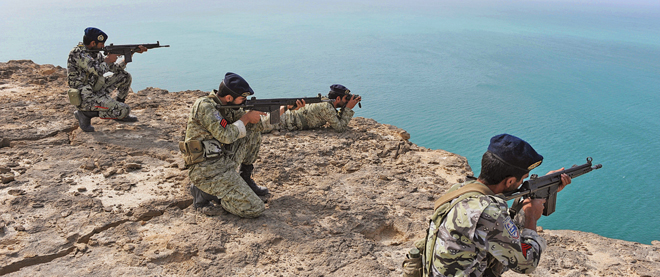The right way for the West to get tough with Iran
Sanctions from members of The European Union are appropriate and necessary
Ali Mohammad/AFP/Getty Images
Share

This week the Western world dramatically increased its sanctions against Iran, an effort to stem the country’s nuclear ambitions. While the array of economic deterrents is now quite broad and deep, the history of sanctions as useful policy weapons is hardly reassuring. For everyone’s sake, we should hope they’re sufficient this time around.
The European Union announced Monday that it will no longer buy Iranian oil. The 27 member countries currently consume a fifth of Iran’s output; the loss of this market will put a sizable hole in the country’s coffers. The EU also unveiled sanctions on currency transactions that will further isolate Iran’s central bank and limit the country’s ability to engage in global trade.
Canada enacted similar sanctions last November, banning almost all financial dealings and expanding the list of goods prohibited from sale to Iran. Taken together with strict measures announced by U.S. President Barack Obama in December, the scope of sanctions aimed at Iran represents an impressive display of unanimity and commitment among Western nations.
But will it work? While most Republican presidential candidates argue Obama has not been tough enough on Iran, there are good reasons to give the economic sanctions time to work.
Admittedly, they have a mixed history. Embargoes and boycotts are often cited as crucial to ending apartheid in South Africa as well as hastening the demise of white-ruled Rhodesia. On the other hand, many decades of American sanctions against Cuba did nothing to end Fidel Castro’s rule. Franklin Roosevelt’s 1940 embargo on the sale of petroleum products and scrap metal to Japan, designed to limit the expansionary plans of the country’s militarist government, proved to be rather too successful. The policy bit deeply, and led directly to Japan’s decision to attack Pearl Harbor. Even when effective, sanctions may yield unintended results. And, as was the case with an earlier campaign against Saddam Hussein’s Iraq, it is often the innocent general populace that suffers the most from economic embargoes.
Despite this uneven record, however, the current international opprobrium amassed against Iran is appropriate and necessary. Iran is the world’s most active state sponsor of international terrorism, denies Israel’s right to exist and refuses to back down from an atomic program that, by any reasonable assessment, aims to provide Iran with nuclear weapons and significantly alter the tenuous balance of power in the Middle East. “The current regime in Tehran poses the most significant threats to global peace and security today,” observed Canada’s Minister of Foreign Affairs John Baird in announcing Canada’s sanctions late last year. “We will not accept Iran acquiring a nuclear weapon,” read a joint statement from the leaders of Germany, France and the U.K. this week.
It is often difficult to discern the monumental from the mundane in our 24-hour news cycle, but the crisis over Iran must be properly recognized as a storyline of historic proportions. Sanctions are worth pursuing if only because the alternative is far more troubling, even if it may seem attractive to Republican candidates.
A pre-emptive strike by Israel or the U.S. to physically remove the threat of nuclear weaponry could easily unleash a firestorm of war and terrorism around the world and presage a clash of civilizations far more serious than in Afghanistan or Iraq. Of course Israel is already suspected of being behind the current shadow war of assassinations and computer viruses (“War by any other name,” International, Jan. 30) being conducted against Iran.
For now, fingers crossed, the sanctions appear to have some traction. The Iranian currency has fallen sharply and financial constraints are making it more difficult for Iran to trade with the rest of the world. Sensing Iran’s weak bargaining position, oil customers not participating in the sanctions—China in particular—are apparently demanding steep discounts that will further depress oil revenues. Iran is now more isolated and fragile than at any time in the 33 years since the Iranian Revolution. Of course Iran has responded to this situation in belligerent fashion—vowing to close the Straits of Hormuz to oil tanker traffic. The U.S. Navy has vowed to not let this happen.
Credible threats and counter-threats are part of any high-stakes effort at diplomacy. But regardless of how Iranian leaders may feel about the necessity of nuclear weapons, it is reasonable to assume ordinary Iranians see things somewhat differently. The 2009 Green Revolution protest movement was brutally suppressed and the Arab Spring has yet to make its presence fully felt there. An emboldened pro-democracy movement (or threat thereof) simultaneous with tough sanctions could prove to be a sufficient inducement for Iran to return to the negotiating table over its nuclear program. Whatever the flaws, tough-minded diplomacy, democracy promotion and outright economic warfare are worth trying in full measure before anyone considers the alternative.